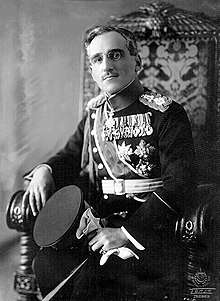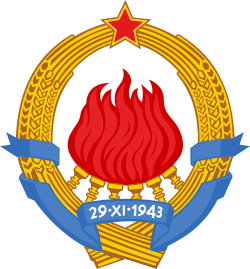6 January Dictatorship
The 6 January Dictatorship (Croatian: Šestosiječanjska diktatura, Serbian: Шестојануарска диктатура/Šestojanuarska diktatura, Slovene: Šestojanuarska diktatura) was a royal dictatorship established in the Kingdom of Serbs, Croats and Slovenes (Kingdom of Yugoslavia after 1929) by King Alexander (r. 1921–34). It lasted from 6 January 1929, when the king prorogued parliament and assumed control of the state, and ended with the 1931 Yugoslav Constitution.
Alexander abolished the Vidovdan Constitution, prorogued the National Assembly and introduced a personal dictatorship on 6 January 1929. The next day, General Petar Živković became prime minister, heading the regime's Yugoslav Radical Peasants' Democracy. On 11 January, the State Court for the Protection of the State was established in Belgrade.
On 20 April, the Croatian fascist Ustaše and Macedonian secessionist IMRO called for the independence of Croatia and Macedonia.
On 25 April, Đuro Đaković, a prominent unionist and the first secretary of the Communist Party of Yugoslavia, was killed by Yugoslav policemen at the Yugoslav-Austrian border, Slovenia, after four days of torture and interrogation in a Zagreb police station.
On 3 October, the state was renamed to the Kingdom of Yugoslavia and was divided into new administrative divisions, called banovine (singular banovina).
On 22 December, Croatian leader Vladko Maček was arrested.
After Alexander was assassinated, he was succeeded by the Yugoslav regency.
Sources
- Dušan Mrđenović (1988). Ustavi i vlade Kneževine Srbije, Kraljevine Srbije, Kraljevine SHS i Kraljevine Jugoslavije, 1835-1941. Nova knj.
- Wayne S. Vucinich; Jozo Tomasevich (1969). Contemporary Yugoslavia: Twenty Years of Socialist Experiment. University of California Press. pp. 22–. GGKEY:5JR74ERLNET.
Further reading
- Stojkov, Todor. Opozicija u vreme šestojanuarske diktature 1929-1935. Prosveta, 1969.
- Gašparič, Jure. SLS pod kraljevo diktaturo: diktatura kralja Aleksandra in politika Slovenske ljudske stranke v letih 1929-1935. Modrijan, 2007.
- Imamović, Mustafa. Pravni položaj verskih zajednica za vreme šestojanuarske diktature. 1991
- Janjatović, Bosiljka. "O progonima hrvatskih političara u Zagrebu za vrijeme karađorđevićevske šestojanuarske diktature." Radovi Zavoda za hrvatsku povijest 26.1 (1993): 161-176.
- Janjatović, Bosiljka, and Petar Strčić. "Nekoliko spisa organa vlasti o komunistima na otoku Krku za šestojanuarske diktature." Vjesnik historijskih arhiva u Rijeci i Pazinu 16.1971) (1971): 91-126.
- Jerotijevic, Zoran. "Економски и политички узроци увођења Шестојануарског режима (Economic and Political Causes of the Introduction of the January Sixth Regime)." Ekonomika 60.2 (2014): 227-238.
- Kaučič, Domen. Odnos Slovencev do kralja Aleksandra I. Karađorđevića: odziv na politične poteze kraljevega dvora v času šestojanuarske diktature: diplomsko delo. Diss. D. Kaučič, 2015.
- Drakić, Gordana. "Arising of the Legal System in the Yugoslav State between the Two World Wars." Proceedings of Novi Sad Faculty of Law 42 (2008).

